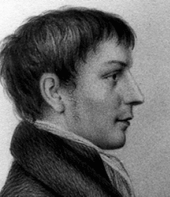
Jakob Maisch is born in Gerlingen on the 19th of October in 1796 as son of Jakob Maisch and Friederike, née Widmaier, who were cofounders of the town Korntal. He joins the Mission House in Basel/Switzerland in 1818 and is there the 16th student. In 1821 he finishes training and is sent to India via the "Church of Mission Society" in England.Jakob Maisch gets appointed in Burdwan/Bengal, in the east of India, and allocated to missionary Dürr who is busy for the mission school. Maisch reports that Dürr's schools are in thrivingly state.
Jakob Maisch writes in a letter to Mission Superintendent Gottlieb Blumhardt about the religions that base on pantheism - the concept that God exists only inside of the world. He describes the difficulty of mission work in India:
"The Holy Scriptures ... are not accepted without examination before ... especially when the people have better knowledge ..., and because they examine mostly with prejudices so it's natural that they say at the end: Our scriptures are older, have more mystics, more rules ... in yours nothing is laid down about eating and drinking. Ours are much better, older, and what's outweigh: they are written in Sanskrit which is the tongue of the gods."
Jakob Maisch, describer of Indian circumstances:
"The nature has lavished here beauty spots in luxuriance, and everything which is needed for keeping it or just for decoration is available in vast amounts: a lot of rice, cotton wool, sugar, indigo, wheat, plenty of cannabis, all kind of fruits on trees, coconuts, pesang and a lot of other kinds of species which to describe would demand more place and more knowledge than mine ..."
Presumably Jakob Maisch gets married with an English women named Harington. He dies in the age of 29 years. Perhaps he was foreseeing his death because short before he writes: "You ought to consider that the planning made by our heart and our wishes for which our heart is longing, all too often get destroyed within 24 hours form the death. Events of death are not rare here, where we are amusing ourselves with our friends this evening and the other evening we pay our last respects at the grave to the same."
What persists is eloquent Jakob Maisch's interesting reporting about life in India. As an intelligent and intensive observer he reports about India, its people, their mindset, about languages, religions, animals and the vegetation, about climate and natural disasters.
